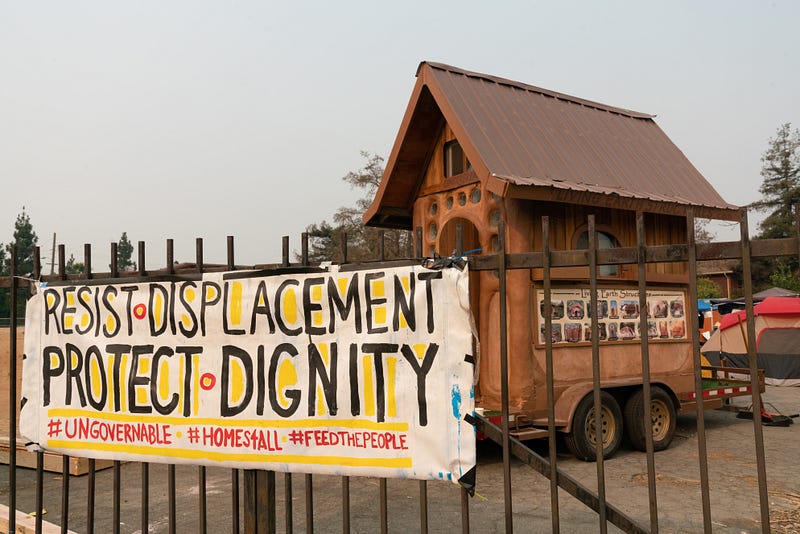The Village residents force City to halt plan to evict them, remove structures
by Robert Hinton

Residents of Oakland’s “The Village,” a homeless encampment in the Brookfield neighborhood, claimed a small victory on Nov. 13 when a federal judge upheld a temporary restraining order against the City of Oakland, which prohibited eviction of residents and removal of all structures.
The case was heard in the U.S. District Court in Oakland at 1301 Clay St. Joshua Piovia-Scott, the plaintiffs’ attorney, told U.S. District Judge Haywood Gilliam that the city needed to provide shelter for the residents of The Village, citing the case of Martin v. Boise.
Under Martin v. Boise, the 9th U.S. Circuit Court of Appeals ruled on Sept. 4, 2018, that cities cannot ban camping in public spaces when there are not proper alternatives for housing. The case effectively makes criminalizing homelessness unconstitutional.
Deputy City Attorney Jamilah Jefferson argued that the restraining order should be lifted because the city was not going to arrest residents or cite them for camping.
Oakland officials are concerned that the camp is getting too large and that semi-permanent wooden structures on the property are not properly built and could pose a risk to residents, Jefferson said.
“The intent is to not have any more people show up or build any more structures,” she said. The camp is located near a school, a senior center, and a library, which Jefferson also cited as a concern for the city.
Judge Gilliam asked Oakland’s attorney to provide a record of violations posed by the camp in order to lift the restraining order, but the defense was unable to produce the necessary documentation. This prompted Gilliam to state that he did not have the power to lift the order.
The city had until Nov. 19 to file additional documentation for the Nov. 26 court date, when the judge will review documents and issue an updated decision on the restraining order.
The camp currently houses 13 residents and includes several tents and wooden structures. Gilliam warned that the camp cannot add any more residents or structures while the defense builds its case to have the restraining order lifted. Povia-Scott ensured the judge that he would advise his clients to stop development of the camp while the case is proceeding.
The Village mainly serves homeless women and their children and takes donations, which get distributed to residents at the camp and other homeless camps around the city. The Village is located in Marcus Garvey Park at the corner of 36th Street and Martin Luther King Boulevard.
Outside of the courthouse, activists celebrated the decision to extend the restraining order.
“We’re just starting the fight,” activist Needa Bee said. “It’s not over yet, but we’re off to a good start.” Bee originally filed the restraining order against Oakland, and she is the founding resident of The Village.
Bee was joined by Candice Elder, founder and director of The East Oakland Collective, and Kaleo Acatar, a resident of The Village. They thanked supporters who attended the hearing and are committed to continuing the fight of behalf of the city’s homeless.
Oakland mayoral candidates Cat Brooks and Pamela Price, as well as newly appointed city council woman from District 2, Nikki Fortunato-Bas, showed up to support the case against the city. Price, a civil rights attorney, advised the plaintiffs in the case.
Fortunato-Bas invited supporters to reach out to her for further assistance.
“Regardless if the city likes us being there or not,” Acatar said, “we’re going to keep on fighting for folks in our situation. Hopefully, this will incline the city to build more affordable housing and programs that really help people in our situation.”
























